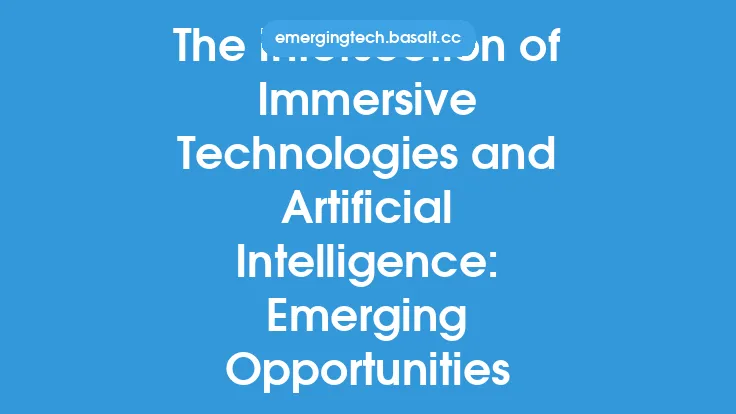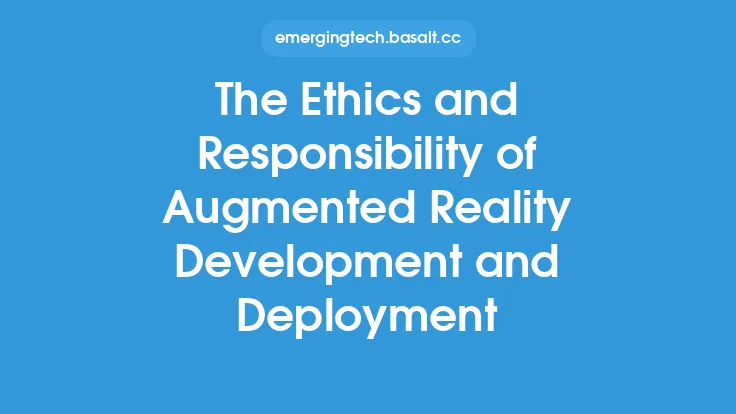The rapid advancement and integration of immersive technologies, such as Virtual Reality (VR), Augmented Reality (AR), and Mixed Reality (MR), into various aspects of our lives have raised significant ethical concerns. As these technologies continue to evolve and become more sophisticated, it is essential to consider the implications and potential consequences of their use. This article will delve into the ethical considerations and implications of immersive technologies, exploring the technical, social, and philosophical aspects that underpin their development and application.
Introduction to Ethical Considerations
Immersive technologies have the potential to revolutionize numerous fields, including entertainment, education, healthcare, and marketing. However, their immersive nature also raises concerns about the impact on users' physical and mental well-being, privacy, and social interactions. For instance, the use of VR headsets can lead to physical side effects such as eye strain, headaches, and nausea, while prolonged exposure to immersive environments can cause psychological effects like addiction, social isolation, and desensitization to violence. Furthermore, the collection and analysis of user data in immersive environments raise significant privacy concerns, as companies may use this information for targeted advertising or other purposes without users' knowledge or consent.
Technical Considerations
From a technical perspective, immersive technologies rely on complex systems and algorithms to create realistic and interactive environments. The development of these systems requires careful consideration of factors such as latency, resolution, and field of view, as these can significantly impact the user experience. Moreover, the use of machine learning and artificial intelligence in immersive technologies raises questions about bias, transparency, and accountability. For example, AI-powered chatbots in virtual environments may perpetuate existing social biases or stereotypes, while the lack of transparency in AI decision-making processes can make it difficult to identify and address potential issues. To address these concerns, developers must prioritize transparency, explainability, and fairness in the design and implementation of immersive technologies.
Social Implications
The social implications of immersive technologies are far-reaching and multifaceted. On one hand, immersive technologies have the potential to enhance social interactions and foster empathy by allowing users to experience different perspectives and environments. For instance, VR experiences can simulate real-world scenarios, enabling users to develop a deeper understanding of social issues such as racism, sexism, and ableism. On the other hand, immersive technologies can also exacerbate existing social problems, such as social isolation, decreased attention span, and decreased face-to-face communication skills. Moreover, the unequal access to immersive technologies can perpetuate existing social and economic inequalities, as those who have access to these technologies may have an unfair advantage over those who do not.
Philosophical Considerations
The development and use of immersive technologies also raise fundamental philosophical questions about the nature of reality, identity, and human experience. As immersive technologies become increasingly sophisticated, they challenge our understanding of what is real and what is virtual, blurring the lines between the physical and digital worlds. This raises questions about the impact of immersive technologies on our sense of self and identity, as well as our relationships with others and the world around us. Furthermore, the potential for immersive technologies to manipulate and influence users' thoughts, feelings, and behaviors raises concerns about free will, autonomy, and the human condition.
Regulatory Frameworks
To address the ethical concerns surrounding immersive technologies, regulatory frameworks and guidelines are necessary to ensure that developers prioritize users' well-being, privacy, and safety. This can include regulations around data collection and use, transparency in AI decision-making processes, and guidelines for the development of immersive environments that minimize potential harm. Moreover, regulatory frameworks can help to promote diversity, equity, and inclusion in the development and application of immersive technologies, ensuring that these technologies are accessible and beneficial to all members of society.
Conclusion
The ethics of immersive technologies are complex and multifaceted, requiring careful consideration of technical, social, and philosophical factors. As immersive technologies continue to evolve and become more integrated into our lives, it is essential to prioritize users' well-being, privacy, and safety, while also promoting diversity, equity, and inclusion. By acknowledging the potential risks and benefits of immersive technologies and working to address the ethical concerns surrounding their development and use, we can ensure that these technologies are used to enhance human experience and promote positive social change. Ultimately, the responsible development and application of immersive technologies require a collaborative effort from developers, regulators, and users to create a future where these technologies are used to benefit society as a whole.





